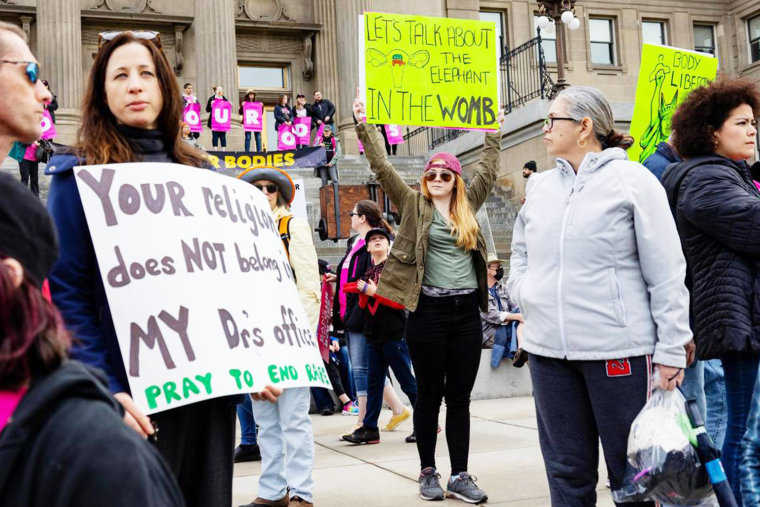The Supreme Court’s next foray into the legality of state laws criminalizing abortions will force them to wrestle with a fundamental question — are pregnant women entitled to the full protection of the law? Women used to be second-class citizens. We were deprived not just of the right to vote, but until very recently, we were deprived of the right to do basic things such as open bank accounts. It wasn’t until 1993, for example, that we reached the point where every state had outlawed spousal rape. Now, less than two years after the Supreme Court stripped abortion rights from the U.S. Constitution, it stands poised to put women’s ability to obtain medical care at further risk.
Are pregnant women entitled to the full protection of the law?
This time, as the court addresses questions related to restrictive state abortion laws, it will focus on a federal law that entitles all people to emergency medical care regardless of their ability to pay for that care. The specific legal question for the justices is whether, under this federal law, pregnant women facing true medical emergencies may obtain abortions even in states that would otherwise outlaw the procedure.
In Idaho and in Texas, state laws that say abortions can only be performed to save a mother’s life conflict with federal law that generally requires hospitals to provide emergency medical care even when there’s a nonfatal threat to a person’s health. That means that in Idaho and Texas, providers cannot perform abortions, even if the procedure might preserve a woman’s fertility or spare her from the risk of a stroke, coma or limb amputation. An abortion can be performed only if it is necessary to stop her from dying.
If the federal law says that a person is entitled to emergency medical care that will “stabilize” them, but Idaho and Texas won’t heed that law, then pregnant women aren’t full people under the law. Unfortunately, the Supreme Court has allowed Idaho to keep its law in place as it considers the federal government’s challenge to the state law. The court has shown us, once again, that a woman’s right to medical care is shaky at best.
We have arrived at this somewhat remarkable legal crossroads because of the impact that former President Donald Trump’s judicial appointments have had on abortion laws. We already knew that Trump’s three appointments to the high court paved the way for it to overturn Roe v. Wade and strip legal protections for abortions from the U.S. Constitution. But what’s becoming increasingly clear is the impact that Trump’s lower court judicial appointees are having on abortion rights. Laws in Idaho and Texas provide near-outright bans on abortions, but decisions by Trump-appointed judges have played a key role in keeping those state laws, which arguably conflict with a superseding federal law, alive.
The Supreme Court argued that its decision in Dobbs, which overturned Roe, would allow it to extricate itself from policing abortion laws. The reality is far from that fantasy world.
President Joe Biden’s administration challenged Idaho’s law on the grounds that it conflicts with a decades-old federal law called the Emergency Medical Treatment and Labor Act (EMTALA) that requires that people be provided medical treatment in emergency rooms when they face a significant threat to their health, not just if they are at death’s door. Shortly after the Dobbs decision, the Biden administration issued guidance on the federal law, explaining that it covers pregnant women who require abortions as a “stabilizing” treatment. This means, according to the administration, that federal law requires certain hospitals to allow women to have abortions when an abortion is the treatment needed to stabilize the patient.
Idaho has argued that the federal law infringes on its sovereignty to make decisions about the health, safety and welfare of its inhabitants, including access to abortions
Idaho has argued that its near-total abortion ban must stand and that the federal law infringes on its sovereignty to make decisions about the health, safety and welfare of its inhabitants, including access to abortions. Idaho has argued that because the federal law does not specifically require doctors to perform abortions, then it does not conflict with its state law. A similar legal battle is playing out in Texas.
Both Idaho and Texas’ laws remain in effect while we wait for the Supreme Court to decide whether pregnant women can seek emergency medical care required by federal law. The high court is set to hear oral arguments in April and will likely rule in late June.
For now, pregnant women in Idaho and Texas who face serious threats to their health including sepsis, preeclampsia and placental abruption have few options. They will have to hope that they can find a way to travel out of state to obtain care. That would, of course, be preferable to forcing such women to hope that their conditions deteriorate enough that it is clear that providing an abortion is the only way to save their lives.
If we need a federal law to protect people's ability to obtain emergency medical treatment, then the court should conclude that the people covered by the law include pregnant women. The opposite conclusion would make women less than full citizens — again.

